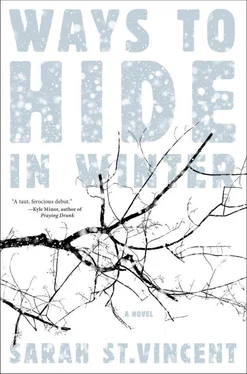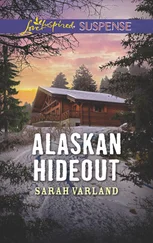The maul hit the wedge with an echoing clang. I gripped the handle and struck again.
“Oh!” He stepped closer and took the handle from me. “I see. Thank you.”
“No problem. That should at least make things easier.”
“Yes, I’m sure.” He paused, looking down at the maul’s heavy, blunt head. I waited.
“May I ask,” he said finally, “if you would like to accompany me for a walk later?”
I looked at him. His eyes were still on the maul.
“It’s nothing…inappropriate,” he added hesitantly, raising his head. “It’s simply that I thought I could stand to stretch my legs a bit. And, you know…” He stopped, glancing away almost shyly. “Life passes by rather quickly, doesn’t it? It seems that while I’m here, I shouldn’t always stay within four walls.”
“Well,” I said, putting my hands in my pockets and shifting my gaze to the stump. The tree must have been two hundred years old by the time it had been cut down; the stump was enormous, sprawling out irregularly, more than a yard wide, a humbled but still imposing reminder of something great that had once been. It occurred to me to wonder if he were afraid of the woods. I didn’t know why the idea hadn’t crossed my mind before; people who weren’t used to places like this always imagined the trail would dwindle and they would find themselves at the mercy of black bears and bobcats and whatever else was lurking in the unknown. Which, of course, was always possible; but then, a lot of things were possible. Many of us experienced the worst disasters of our lives while doing something perfectly ordinary that everyone did.
“May I ask you a question?” I said at last, looking up into his face.
“Of course.” He laughed, sounding faintly relieved. “I believe you just have.”
I studied him, unsure how to find the words that would do what I had long since learned not to do, that would ask something as direct as, Who are you? It seemed too much like an opening, a crack that could allow someone else’s all-too-curious arm to reach into my own thoughts later.
“The scarf,” I said instead. “I was just wondering. You always keep it around your face—you look like you’re about to rob a bank.”
“Oh,” he said. “No, no. Is that why you were so frightened when I first came into the store?”
“Frightened? I wasn’t frightened.”
He raised his eyebrows. “You looked frightened.”
“It takes a bit more than that to scare me, I think.”
“There’s nothing to be ashamed of in being frightened. In my view.” Before I could reply, he continued, “I wear the scarf like that because my lungs are rather weak. It’s no big secret.”
“Weak? Have you been sick?” That would explain the almost otherworldly paleness, I thought.
“No. Well, not recently. It was a long time ago. I was taken in for questioning, in my country, and they made me sleep on the floor with other people. It was cold, and I got sick. After I got out, the doctor told me I should protect my lungs when I’m outside, so I use the scarf. There’s some scarring or something in there, apparently.” He gestured at his chest.
I looked down, prodding the muddy ground with my toe. “‘They’?”
“Pardon me?”
“You said ‘they’ took you in for questioning, or something.”
“Oh. Yes.”
“You mean the police?”
“Something like that. Not the ordinary police, but a kind of special police. The police who do these things. It’s difficult to explain.”
“Special police? You mean, like, secret police?”
“In a sense. I forget exactly what it is in English.” He pulled off his hat and scratched his head. “‘Intelligence,’ maybe?”
A vision of this fragile-looking foreigner shivering on the floor of a cell swam into my mind, and I winced. “I’m sorry. I shouldn’t have asked.”
“Don’t be sorry! It’s all right. As I said, it’s no secret.” He gave the maul a short, experimental swing, as if it were a golf club.
I looked at him.
“You know, it’s odd,” I said after a moment.
“What’s odd?”
“That you would tell the truth about that, but lie about being a student.”
His face tensed, but his response came in a light tone. “Why would I lie about that?”
“That’s what I’ve been wondering, I guess. But it’s all right. You don’t need to answer.” I scuffed at the ground again, then looked up at him. “I asked you if I could ask one question, not two.”
He smiled wanly.
“I’m sorry,” I said. “But listen. Remember what I said about using the maul first. If you just use the axe, it’s going to take forever and you’ll wind up splitting your foot instead. I have to go open the store now.”
“Okay,” he said, but cleared his throat as I turned to go. “Although you never answered my own question, I think. About the walk.”
“Oh.”
As I looked at him, I realized for the first time that a deep sadness seemed to suffuse his entire figure, making him look smaller and frailer than he really was. Even when he stood straight, he looked stooped.
“Sure,” I replied, suddenly embarrassed. “I guess I don’t see why not. Maybe Sunday, if you’re still here then.”
“Okay.” He shifted his weight, gripping the maul awkwardly. “Thank you. You’re—you’re a good girl.”
I must have looked at him strangely, because he turned back to the stump, eyeing the log with the wedge embedded in it as if he had suddenly been put in charge of a military strategy, tasked with figuring out how to crack enemy lines.
He labored most of the morning, until, I thought, blisters must surely have left his hands bloody and sore, in spite of the gloves he had found somewhere. Watching him through the window, I thought of the prisoners of war, their vanished camp with its vanished guards, an entire village that had left behind only rotting rectangles of timber and cement, deep in the woods. Unlucky German and Japanese officers who, I thought, had probably split wood and carried water from dawn until dark, sweat soaking the shirts on their backs. Laboring alone and unseen, trapped in the forest in a strange land. No one knew for certain what had become of them, afterward. There was no list of their names. Ghostlike they had come, and ghostlike they had disappeared into the strange, winding tunnels of the past.
They must, I reflected as I watched the stranger, have been very homesick when they were here. Even if they were soldiers.
Although of course, it wouldn’t be right to pity them. They had been on the side that was responsible for murdering all those people, after all. And if they had toiled and sweated and maybe even died hidden away somewhere in the woods of Pennsylvania, well, there were worse fates.
By noon, the stranger was clearly tired. Nevertheless, his thin arms in the padded, musty coat continued to move, up and down, up and down, like a human piston driven by some invisible and pitiless machine.
Sunday came, and I pulled up in front of the hostel, watching the stranger’s slender figure peel itself from the wall like a shadow.
When I stayed in the car, he walked toward me, glancing around, hands stuffed into his pockets and scarf tied firmly around his face. It was a bright day, the nicest we’d had in weeks, sharp sunlight glinting on the ice that coated the trees. I rolled the window down. “Go ahead and get in. I’ll take us to Tumbling Run.”
He looked at the car nervously, twisting a foot into the gravel. “I really shouldn’t go very far, I think. Maybe we could just stay close to here?”
I paused with my hands on the wheel. “I don’t know. It’s up to you, I guess. I thought a change of scenery could do us both good.”
Читать дальше












